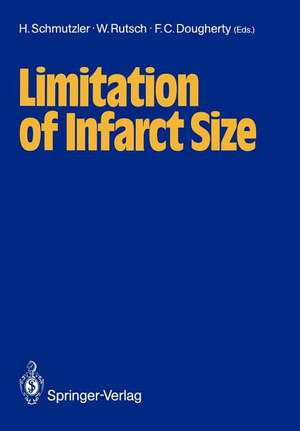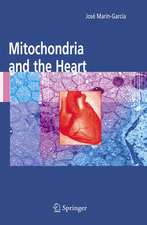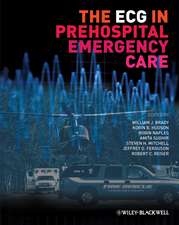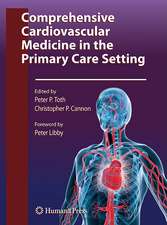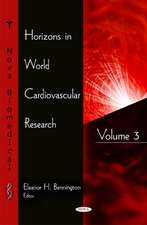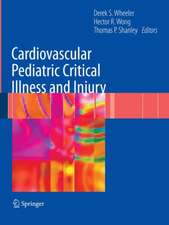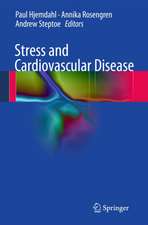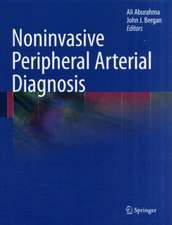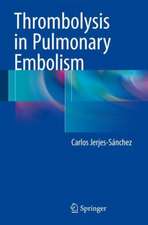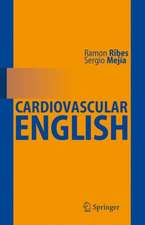Limitation of Infarct Size
Editat de Horst Schmutzler, Wolfgang Rutsch, Frank C. Doughertyen Limba Engleză Paperback – 15 dec 1988
Preț: 718.10 lei
Preț vechi: 755.88 lei
-5% Nou
Puncte Express: 1077
Preț estimativ în valută:
137.40€ • 144.23$ • 114.05£
137.40€ • 144.23$ • 114.05£
Carte tipărită la comandă
Livrare economică 10-24 aprilie
Preluare comenzi: 021 569.72.76
Specificații
ISBN-13: 9783540191483
ISBN-10: 3540191488
Pagini: 296
Ilustrații: XVI, 279 p. 22 illus.
Dimensiuni: 170 x 244 x 16 mm
Greutate: 0.48 kg
Editura: Springer Berlin, Heidelberg
Colecția Springer
Locul publicării:Berlin, Heidelberg, Germany
ISBN-10: 3540191488
Pagini: 296
Ilustrații: XVI, 279 p. 22 illus.
Dimensiuni: 170 x 244 x 16 mm
Greutate: 0.48 kg
Editura: Springer Berlin, Heidelberg
Colecția Springer
Locul publicării:Berlin, Heidelberg, Germany
Public țintă
ResearchDescriere
Effective treatment of acute myocardial infarction remains one of the major issues in cardiology and internal medicine. The present monograph summarizes the relevant experimental data and the results of major clinical trials in the treatment of myocardial infarction. There are contributions of fundamental anatomical and physiological concepts of vascular occlusion and myocardial damage due to ischemia as well as discussions of therapeutic strategies involving thrombolytic agents, adjuvant drug therapy for limitation of myocardial damage, improvement in myocardial tolerance to ischemia and prevention of coronary reocclusion. In this regard, there is an extensive discussion of the role of coronary angioplasty and bypass surgery in the setting of acute myocardial infarction.
Cuprins
Pathogenesis and Pathophysiology of Coronary Occlusion.- Can Infarct Size Be Limited? Prospects for “Injury-Delaying” Therapy.- Pathophysiology of Evolving Myocardial Infarction.- The Pathogenesis of Thrombosis in Human Atherosclerotic Coronary Arteries.- Thrombogenesis and Vascular Occlusion.- Evaluation of Myocardial Perfusion by Means of Contrast Echocardiography.- Discussion (edited by R. Parratt).- Limitation of Infarct Size by Nonthrombolytic Drugs.- Estimation of Acute Infarct Size In Vivo.- Pharmacology of Cardioprotection.- Calcium Antagonists and Ischaemia: A Critical Evaluation.- Can Myocardial Infarction Be Prevented or Limited by Nonthrombolytic Drugs?.- Newer Aspects of Drug Therapy: Free Radical Scavengers.- Stimulation of Vascular Prostacyclin Formation by Defibrotide: A New Strategy for Treatment of Acute Myocardial Ischaemia.- Discussion (edited by P. Lichtlen).- Limitation of Infarct Size by Thrombolytic Therapy.- Thrombolytic Therapy: State of the Art.- Early and Prehospital Thrombolytic Therapy in Acute Myocardial Infarction.- Status of Thrombolytic Therapy in Acute Myocardial Infarction in France.- Adjuvant Therapy for Coronary Reperfusion in Evolving Acute Myocardial Infarction.- Perspectives on Newer Thrombolytic Agents.- Discussion (edited by F. C. Dougherty).- Follow-up Therapy after Thrombolysis.- Is Immediate Angioplasty Required to Restore Coronary Blood Flow at Rest After Recanalisation with Intravenous Recombinant Tissue-Type Plasminogen Activator in Patients with Acute Myocardial Infarction?.- Angioplasty After Thrombolysis: Early and Late Angiographic Results.- PTCA in Acute Myocardial Infarction.- What is the Place of Surgery Soon After Thrombolysis?.- The Use of Cardiovascular Drugs Following Thrombolysis in Humans.- Discussion (edited by F. C. Dougherty).- Prevention of Occlusion or Reocclusion.- Factors Influencing the Rate of Coronary Artery Occlusion and Reocclusion.- Which Antithrombotic Therapy Has Proven Most Effective for the Treatment of Deep Arterial Injury, Ruptured Plaque, and Post-Thrombolysis?.- Agents Effective in the Limitation of Myocardial Ischaemic Damage: Present Concepts and Future Possibilities.- Discussion (edited by F. C. Dougherty).- Therapeutic Strategies for Limitation of Infarct Size.- Panel members.
